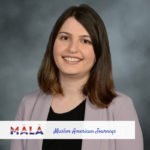Rozan Abdulrahman: Adjusting to a Fluid Identity
Rozan comes from a Kurdish family who received asylum in the U.S. after they fled civil conflict in Iraq. Here, she describes some of the obstacles she faced adjusting to life in the U.S., her career in healthcare, and the fluidity of identity.
The gunshots pierced our ears as we walked home from school. My bones rattled and legs shook. I was paralyzed with fear. My friend grabbed my hand and pulled me to the ground for safety. We were only five-years old but were all too familiar with this violence. We hid behind a parked car on the street and waited for silence before continuing cautiously on our journey home. This was my life in Iraq. My family belongs to the minority ethnic group in Iraq called the Kurds and we experienced frequent attacks in a civil feud. A few years later, my family was fortunate enough to receive asylum in the U.S. but the fear of losing my life simply because of my ethnic and religious identity inspired another journey for me: to embrace my unique individuality while celebrating the common humanity that connects us all.
Adjusting to the American lifestyle at the age of seven was difficult at first. There was no ESL (English as a Second Language) program for Kurdish students in New York City. All the students in the ESL class were Spanish-speaking so our teacher taught English in the Spanish language- how frustrating! I felt lost and forgotten.
To escape the harsh realities of my schooling, I turned to the one source of comfort that never let me down: cartoons. Each day after school, I spent my time watching Dexter’s Laboratory, Rugrats, and Hey Arnold. These cartoon shows not only allowed me to de-stress, but they also taught me English. Within a few months, I was exceling so quickly in my classes that I was removed from the ESL program. I no longer felt isolated from my new community, which now welcomed me with open arms.
But my story of assimilation is unique. I don’t “look” foreign: I am fair-skinned and have brown hair. Without knowing my last name (or the spelling of my first name for that matter), most people don’t assume that I am Muslim, let alone an Iraqi-Kurd. My physical appearance afforded me every opportunity that any other American had, but I was still deeply conflicted with reconciling my American identity with my Muslim culture.
While attending college at Bard College at Simon’s Rock, I examined the role of culture on health beliefs and practices through my studies of Biology and Cross-Cultural Studies. Though the college was small, the student body was diverse. As the President of the International Students Club, I collaborated with my fellow students, faculty and staff- Muslims and non-Muslims alike- to organize events that celebrated such diversity, including an international potluck, international fashion show displaying apparel from over 15 countries, and fundraiser for disaster relief efforts post-Cyclone Nargis in Myanmar. These events highlighted the fluidity of our identities and the critical components of understanding and respect in a community as diverse as ours-domestic and abroad.
These values on diversity and identity continued to influence my life as I developed my career in healthcare. I work to bring more personalized medical care to underserved communities. I have learned that people not only require their health needs to be addressed but they also want their decisions on their lifestyle to be understood in the context of their beliefs and culture.
Throughout these experiences, I’m always reminded of how this journey started: with the sound of gunshots. The fear of losing my life has helped me to realize how precious it really is and motivated me to pursue a path dedicated to embracing my own identity as a Muslim, an advocate and as anything else that I choose to be.


